Use NBA Win Share Stats to Win Bet on the NBA

NBA win share statistics are a composite basketball stat that attempts to capture an individual player’s overall contribution to their team, expressed as a ‘share’ of the team’s total wins over the course of a season.
Each win share a player earns suggests their overall efforts have contributed one win to the team’s total record for the season.
The math used to calculate this statistic is complex, but using it to inform your basketball wagers is simple and easy to apply to NBA point spreads. This comprehensive guide covers everything you need to know about using NBA win share statistics to bet smarter and make more money.
Why Use NBA Win Share Stats?
Win share statistics are useful to bettors because they combine multiple indicators into a single number that represents each player’s relative value to the team. These composite data points are extremely useful when considering the impacts of lineup changes following injury or trades.
Combining the win share indicators for the entire team can also provide a helpful second point of reference to judge a team’s overall quality. This is useful as a secondary metric when comparing two teams that have similar win-loss records or otherwise look similar on paper.
We cover both of these strategies in detail below. First let’s review some concepts and terms you need to understand before handicapping with NBA win shares.
Where Do These Stats Come From?
Win share stats are a relatively recent creation, inspired by a baseball handicapping method originally outlined in the statistics book Win Shares.
Justin Kubatko of Basketball-Reference.com quickly recognized the value of proportionally dividing credit for team success in basketball, where individual players have a massive influence relative to many other team sports.
Kubatko created a new formula using readily available player stats to calculate the number of wins each player contributes to the team each season, and basketball win shares were born.
Offensive vs Defensive Win Shares
There are different NBA player statistics referred to as ‘win shares’: offensive win shares, defensive win shares, and overall win shares.
There’s also a metric called ‘win shares per 48 minutes,’ which we cover with a detailed section below. Here’s a quick look at the significance of the three primary metrics:
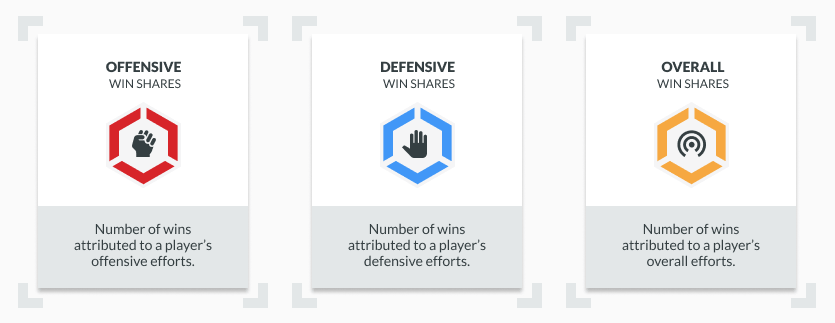
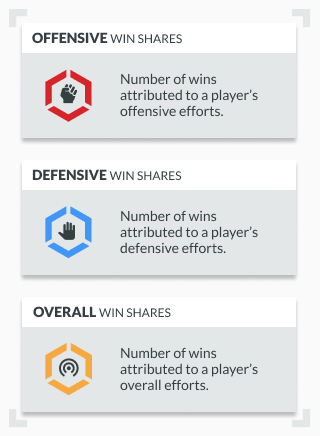
Note that every player is assigned an offensive and defensive win share, regardless of their position and style of play.
Why Consider Both Offensive and Defensive Versions?
Comparing a player’s offensive vs defensive win shares tells you where players are making the most impact, painting a more detailed picture of how their presence on the court might affect the game.
For example, say a star player with an excellent defensive win share rating suffers an injury and will miss an upcoming matchup. The impact of his absence might be more pronounced against a team with excellent offensive team stats.
Win Shares Per 48 Minutes (WS/48)
There is one fundamental flaw with win shares – they rely on ‘counting stats’ that aren’t weighted by playing time. As such, they heavily favor players who spend more time on the court.
This is where win shares per 48 minutes (WS/48) comes in. WS/48 levels the playing field to judge the impact of each player if they all played the same number of minutes.

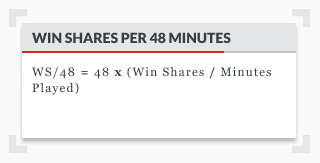
Rather than functioning as an aggregate ‘counting stat’ like regular win shares, WS/48 also measures the efficiency of a player’s contributions.
As such, WS/48 is a better metric when handicapping the potential impact of a substitute player coming off the bench or stepping up to take the place of an injured starter. Always remember that a starter’s win shares are inflated by the additional time they spend on the court.
When to Use NBA Win Shares
NBA win shares are most useful as an indicator of a player’s overall importance in their team’s ability to win. They can also be used to compare the overall quality of two players, but note that the formula to calculate them also includes team statistics. This disadvantages talented players on less successful teams.
Win share stats can therefore be used to determine how much of an impact the loss of a player will have on the team’s ability to win.
Win share stats are most useful when considering the impact of injuries on the NBA moneyline. They can also be used to roughly inform spread bets but note that other advanced stats like team offensive efficiency better account for scoring efficiency.
Win shares are highly predictive of moneyline results, where a team’s ability to score is secondary to their ability to win. When betting a large spread, on the other hand, you also want to consider each team’s ability to quickly put points on the board.
Finding Value Bets with Win Share Stats
Use win share stats to identify games in which the oddsmakers have miscalculated the significance of injuries on each team’s ability to win. Here’s what you need to do:
- Using the projected rosters for the game in question, find the WS/48 of each player expected to play.
- Make a projection regarding how many minutes you expect each player to play. Looking up their minutes per game is a great place to start.
- Take each player’s expected number of minutes played, multiply it by their WS/48 and divide by 48. This will give you their expected win share per game. Multiply this number by 82 (total # of games played each season) to find their projected win share for the season.
- Find the sum of all player’s projected win share for the season to find a ‘total win share’ for each team – this is a rough estimate of how many games they should win during the season. Divide this number by 82 to project how often this specific roster would beat an average team.
- These win expectancy vs average numbers can be used to calculate the percentage of the time the favored team can be expected to beat the underdog.
- Adjust each team’s win expectancy for this specific game based on how far above or below average their opponent is.
Let’s look at an example of this last step, which is the most complicated. The Denver Nuggets are playing the Golden State Warriors, who are favored:
Say you’ve calculated the Denver Nuggets roster in question will beat an average team 40% of the time. They are underdogs vs the Golden State Warriors, whose roster should beat an average team 60% of the time.
Because an average team wins 50% of the time, we know the Nuggets win 20% less often than an average team. As such, we increase the projected win expectancy of Golden State vs. an average team by 20% of its original value. This value (72%) is Golden State’s win expectancy when playing the Nuggets with these specific players on the court.
Using Win Shares to Project Season Win Totals
Steps 1 – 4 alone can also be helpful when betting on NBA team season win totals. The ‘total win share’ you get after adding each individual player’s projected win share is a strong predictor of the team’s likely overall performance.
The tricky part is estimating the total number of minutes every player on the roster will play in an average game, but this gets easier as the season goes on.
Comparing these projected win share totals is also useful when comparing the overall quality of two teams that otherwise look similar on paper.
When Not to Use Win Shares
Win shares are widely considered one of the best metrics of any player’s overall value to their team. That said, there are some circumstances where using them just doesn’t make sense:
- Betting totals: As mentioned above, finding the sum of a team’s win shares doesn’t tell you much about their ability to put points on the board. Strong teams with a slow pace may have lots of players with high win share stats, but that doesn’t mean they’ll create high-scoring games.
- Evaluating recently injured players: Injured stars who miss significant playing time will see their win shares take a serious hit, even if they’ll immediately change their team’s fortunes when they return to the court.
- Head-to-head player comparisons: Because win share stats combine team and player statistics, they favor players on more successful teams. This can be problematic when trying to do an apples-to-apples comparison of individual player skill level across different teams.
Using the right stat at the right time is the key to successfully using data to inform your NBA wagers.
How to Calculate Win Share Stats
Kubatko uses separate formulas to calculate win share statistics for three major ‘eras’ in NBA history, making use of the most relevant player stats available for each respective era.
Of course, this article is focused on using win shares to bet on current NBA games. Here are the formulas used for the current era.
Disclaimer: Unless you’re a fan of math or a masochist, there’s no reason to calculate win share stats yourself. Basketball-Reference has already done the calculations for every player in the league:
Calculating Offensive Win Shares
To calculate offensive win shares, you first need to find points produced and offensive possessions for the player you’re evaluating. You can use these numbers to calculate marginal offense and marginal points per win, which are used to find the player’s offensive win share.
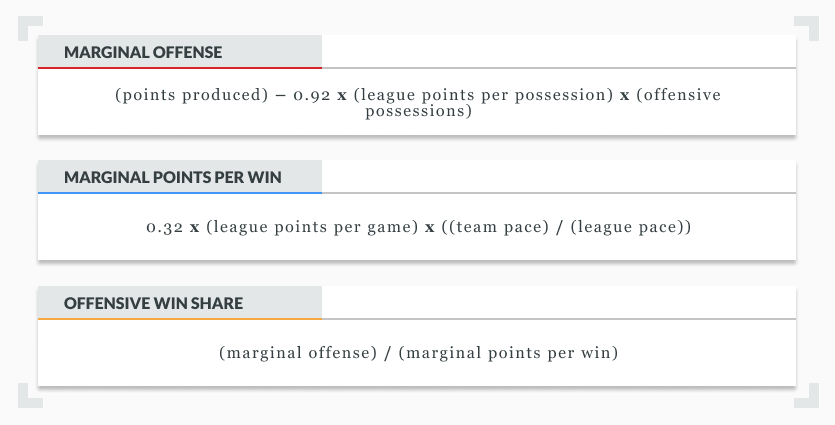
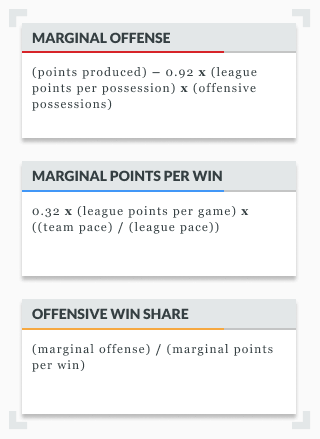
Calculating Defensive Win Shares
To calculate defensive win shares, you need the defensive rating of the player you’re evaluating. Using this stat, you can calculate marginal defense and marginal points per win, which can then be used to find the player’s defensive win shares.
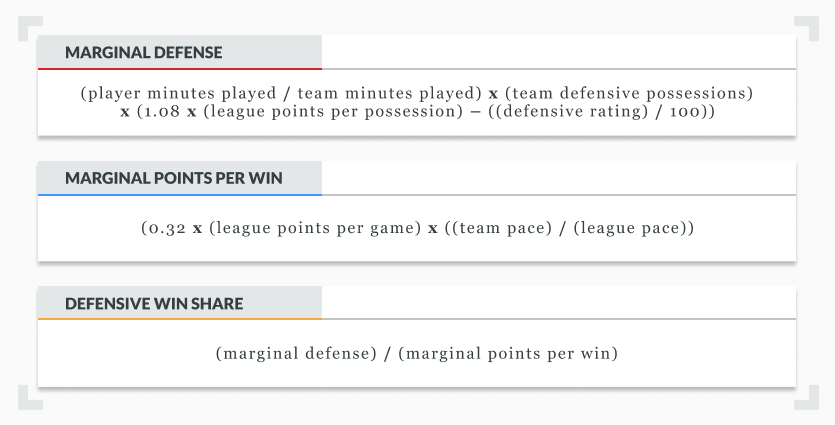
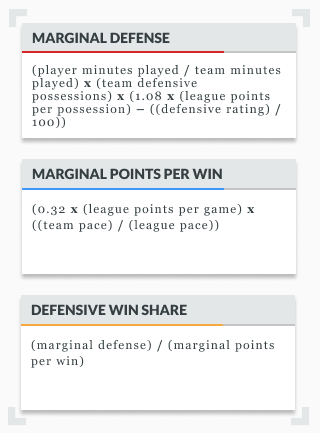
Calculating Overall Win Shares
Luckily, calculating overall win shares is easy once you’ve found the offensive and defensive values. All you need to do is add them together to find the number of wins the player has contributed to their team.

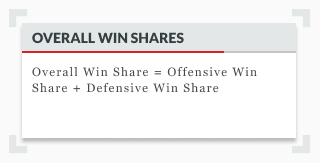
Looking for More NBA Betting Strategy?
Betting on the NBA is challenging, but there’s plenty of information out there to help you be successful. If you’re looking for more straightforward basketball betting advice, explore the range of NBA articles in our how to bet on sports section.
You can also find more advanced betting strategies in our sports betting strategy section. As always, please remember to wager responsibly, and enjoy the action out there.

Evergreen Manager; Sportsbook Expert
Following a sports journalism career with his work appearing in outlets like theScore, The Province, and VICE Sports, Patrick moved into the world of content marketing to bridge the gap between great writing and SEO success. He’s brought that same mindset to lead evergreen content efforts at SBD.



